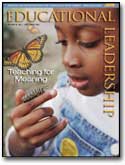- My government teacher, Mr. Young, was an interesting guy. He was funny, he had been in the Air Force, he made class fun. Plus, the class dealt with current events, things that were noticeably affecting us and the world. . . . In one class we watched two short videos about the welfare system. In one video, the system was a saving grace; in the other, it was a crutch for the lazy. He had us debate what we thought about the system.
- One class I want to mention is AP calculus, taught by Mr. Delia. Now I don't think I could say I enjoyed his class. It was dense, difficult calculus. But I can say from the moment I walked into the classroom to the moment I heard the bell ring, I was on my toes. Sometimes he would run around the room because he was in such a rush. He pushed himself, and us, to the limit. And because he was so energized about the subject, he would draw—maybe demand—your attention and your respect. I learned so much so fast in that class.
- My English teacher was an older man, Dr. Pasteur, an emigrant from Holland. As part of our grade for his class, we each had to choose one American literary figure on whom we would become an expert throughout the school year. I chose playwright Eugene O'Neill. I read all his plays and learned about his life. I don't remember the final product we had to produce, but I do remember the pleasure of having the time to delve into one subject deeply and to feel knowledgeable about that subject.
- One teacher, Ms. O'Connor, tested us on one of the first days of class on how many things we had noticed on our way from the school entrance to her classroom. I had noticed two things maybe, three at best. She spent the year teaching us to be present and to pay attention to the world around us.
- I'd like to share a story about my daughter. Her 4th grade teacher, Mr. Heiliger, emphasized writing in his classroom. He had students read their work to their classmates and encouraged students to provide constructive feedback. One day he mentioned to my daughter that she was quite a talented writer—that in fact he expected to see her work published some day. That was all it took. My daughter has been writing ever since and considers herself a writer. She likes to write fiction best.
The narratives that my coworkers related about meaningful classroom experiences have several elements in common. They speak of teachers who had high expectations; fostered accomplishment; offered encouraging feedback; and generated surprise, even drama, in the classroom. And they almost all mentioned by name a teacher who had in the course of a moment or a semester—whether by force of personality, caring, subject knowledge, or teaching technique—left a lasting impression. Some stories were specific—the time the teacher brought in a peanut plant to class—and some were impressionistic—“I don't know why I liked that class so much. It wasn't so much what happened. It was the individual teacher.”
We begin this new school and publishing year with an issue on what author Jacqueline Grennon Brooks (p. 8) calls “the uncontested purpose of education”—Teaching for Meaning.
In Authentic Achievement: Restructuring Schools for Intellectual Quality (1996), Fred Newmann and colleagues wrote that authentic achievementstands for intellectual accomplishments that are worthwhile, significant, and meaningful, such as those undertaken by successful adults: scientists, musicians, entrepreneurs, politicians, crafts people, attorneys, novelists, physicians, designers, and so on. . . . For students . . . three criteria [are] critical to significant intellectual accomplishment: construction of knowledge, disciplined inquiry, and the value of achievement beyond school. (p. 24)
Our authors acknowledge that teaching for authentic achievement is a complex and difficult task—one that goes beyond teaching skills and facts, one that involves connecting with the students (see “The Engaged Classroom,” p. 20) and showing them how to use knowledge in real-life contexts (see “Knowledge Alive,” p. 14).
Authors Jay McTighe, Elliott Seif, and Grant Wiggins (p. 26) address challenges that sometimes interfere with meaningful teaching, especially the need to prepare students to pass standardized tests. They argue that a teacher can indeed do it all—teach students what they need to know to pass the tests and teach students that learning school subjects connects to living. But they can do both only if they remember which one is their priority.
Welcome to the new school year. Why not ask your students and colleagues about their most meaningful classroom experiences thus far? And remind yourself, this may be the best year ever for them, and for you.

